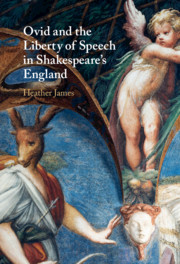3 results
Chapter 4 - In Pursuit of Change
-
- Book:
- Ovid and the Liberty of Speech in Shakespeare's England
- Published online:
- 18 June 2021
- Print publication:
- 08 July 2021, pp 140-183
-
- Chapter
- Export citation
Introduction - Taking Liberties
-
- Book:
- Ovid and the Liberty of Speech in Shakespeare's England
- Published online:
- 18 June 2021
- Print publication:
- 08 July 2021, pp 1-19
-
- Chapter
- Export citation

Ovid and the Liberty of Speech in Shakespeare's England
-
- Published online:
- 18 June 2021
- Print publication:
- 08 July 2021


